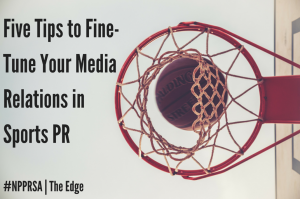 Good communication skills and strong media relationships are essential for any PR professional to be successful with those they work with, but with the different public relations industries becoming more and more niche these days, there are some keys things to keep in mind depending on which media outlets you are pitching and working with the most.
Good communication skills and strong media relationships are essential for any PR professional to be successful with those they work with, but with the different public relations industries becoming more and more niche these days, there are some keys things to keep in mind depending on which media outlets you are pitching and working with the most.
For those working in the action-packed and non-stop sports and entertainment industries (or looking to get into these areas), here are five tips to keep in mind to help you fine-tune your media pitches, break through with key media contacts and more to further develop your media relations:
Timeliness & Relevance
As the old saying goes, “timing is everything.” In the sports and entertainment industries, this is even more important to remember when it comes to PR and pitching specific media reporters whether they are with long or short lead outlets.
More often than not, unless something is breaking news, it is best to tie your media pitches into something timely occurring that the outlet and reporters are covering (or could cover) whether it a large sporting event (such as the Olympics, FIFA World Cup, US Open, etc.), the start of a new sporting season (like golf and tennis season swinging under way each summer or football season and college sports getting started again each Fall) or anything else that’s relevant so that there is a direct tie-in to the media reporter and their upcoming editorial calendar an outlet.
Keep the Competition in Mind
When working in the sports and entertainment industries and with the media coverage surrounding them, to say it is a highly competitive space for coverage would be an understatement. When pitching various media try to keep in mind everyone else they are being pitched by and those who work with leagues, teams, events, brands, athletes, etc. and try to determine what your best pitch angle is to make you stand out from the rest and break through to the media contact.
In addition to the timeliness and relevance of what you are pitching, think of creative ways to enhance your pitches by determining the best subject line (and one that isn’t over the top or misleading), including images with your text or bullet-pointing information so your pitch helps you get straight to the point.
Don’t Get Discouraged if You Don’t Hear Back
Sometimes I like to think that “PR” more accurately stands for “persistency = results.” Like when sending out a press release announcement to a large database of media contacts (or on a newswire), you don’t always receive a lot of immediate feedback from those you sent it to.
If you don’t hear back on your pitch within an appropriate amount of time (of which there is no magic rule of thumb for), make sure and send a follow-up email or give them a call to see if they received your information. As for cold call media pitching, it seems more media prefer to receive email pitches first before being cold-called with pitches but that once you have established communication or a relationship with them that they are more willing and likely to talk on the phone with you.
Making Sure You Manage Expectations
For those of us who work in sports along with a lot of us who work in public relations, the phrase “under promising and over delivering” is very important to remember. This applies not only to those you work with/for, but also the media you’re building relationships with and collaborating on coverage opportunities.
When it comes down to things like determining how much time a media reporter can have in an interview or how much time they need to schedule photo shoots, it’s important to be aware of tight timelines and deadlines. It is in everyone’s best interest to be honest and forthcoming about what you (and who you work with/for) can and cannot do so that you are appropriately managing the media’s expectations. By doing so, this will help you with building lasting media relationships for both the short term and long term.
Keep up with What the Media are Covering
With the integration of social media into our daily lives and almost every move we’ve made in the past five or six years, this has become both a blessing and a curse at times for those of us who work in PR. Social media demands our constant attention (not to mention that sports related coverage consumes about 90% of twitter and all tweets produced daily).
However, social media also provides us an opportunity to follow key media reporters, see what they are covering and determine better pitches to add a more personable touch to connect with them and develop our relationships. While it is impossible to follow every media contact you want to get through to and see what they are covering, for the ones you do follow it allows some extra insight on events they are planning to attend, products they like, things they are passionate about and any other tidbits of information you might not have known otherwise that can help you determine a good tie-in when getting in touch with them.
I would also keep in mind that social media channels are NOT the best or recommended way to pitch key media contacts, but that it can’t hurt to respond to their posts and engage in conversations that potentially could help make you stand out to them when they do receive pitches and emails from you at another time.
About the PRSA Entertainment & Sports Section
Practitioners working in the high-profile worlds of sports and entertainment face unique challenges. PRSA’s Entertainment and Sports Section offers great opportunities to connect with peers who understand your issues and are willing to share solutions. Through in-person and virtual networking events, newsletters and other resources, the Section helps practitioners develop public relations and management skills directly relevant to their entertainment and sports environments.
 Natalie P. Mikolich, is the 2016 Chair-Elect of the PRSA Entertainment and Sports Section and the Founder of npm|pr (www.npmpr.com). Natalie has worked with a variety of national businesses in different industries ranging from sports, fitness, health, beauty and luxury lifestyle to non-profit organizations and special events in addition to world class professional and Olympic athletes. Along with this, Natalie has provided public relations services for some of the leading global sports and entertainment agencies. Follow her on Twitter @npmikolich.
Natalie P. Mikolich, is the 2016 Chair-Elect of the PRSA Entertainment and Sports Section and the Founder of npm|pr (www.npmpr.com). Natalie has worked with a variety of national businesses in different industries ranging from sports, fitness, health, beauty and luxury lifestyle to non-profit organizations and special events in addition to world class professional and Olympic athletes. Along with this, Natalie has provided public relations services for some of the leading global sports and entertainment agencies. Follow her on Twitter @npmikolich.
